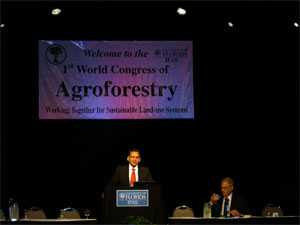"Peace and stability in the world cannot be built on human misery in the Third World." Nobel Laureate Norman Borlaug concluded his inaugural address with those words to the delegates attending the first World Congress of Agroforestry in Orlando, Florida. He said that agroforestry will continue to have an important role in alleviating both poverty and environmental degradation in low-income countries.
Diverse examples of agroforestry used by rural people around the world, both to improve their livelihoods and the environment, were highlighted by this international gathering of agroforestry scientists, educators, policy makers and practitioners. A total of nearly 600 delegates came from 82 different countries to attend the Congress from June 27 to July 2.
 |
Dr. P.K. Nair, Distinguished Professor at the University of Florida and organizing committee chair, addresses delegates to the 1st World Agroforestry Congress in Orlando, Florida at a plenry session moderated by Dr. Gene Garrett. (Photo by M. Merwin) |
On the last day of the Congress, the delegates adopted the "Orlando Declaration" (PDF, 75 kb) as one of the tangible outcomes of the meeting. The Declaration states that the adoption of agroforestry over the next decade will "greatly enhance the achievement of the United Nations Millennium Development Goals" by increasing household income, promoting gender equity, improving health and welfare of people, and promoting environmental sustainability.
"There is a global need," the Declaration concludes, "for increased investments to support research, technology development, and extension to improve the integration of agroforestry with broader natural resource and watershed management efforts. We urge governments to highlight the role of agroforestry in their poverty eradication strategies, provide funding, and develop policies that promote agroforestry adoption to spark an agroforestry revolution."
During the final session of the Congress, Howard Shapiro of Mars Inc. observed that agroforestry extends the Green Revolution into an "Evergreen Revolution." He suggested that "GDA - Gross Domestic Agroforestry" serve as a measure of sustainability for nations alongside economic output.
The Congress was hosted by the University of Florida Institute of Food and Agricultural Sciences and organized by a global committee chaired by Dr. P.K. Nair of the UFL Center for Subtropical Agroforestry. More than 25 public and private organizations from four continents co-sponsored the event, including AFTA. A poster was presented on behalf of AFTA entitled "Temperate Agroforestry Outreach Initiative for Small Landowners in North America" (PDF, 2 MB).
In addition to compiling abstracts of the papers and posters presented, the Congress also launched a new book series entitled Advances in Agroforestry published by Kluwer Academic Publishers. Review papers on a wide array of topics from both temperate and tropical climate zones are collected in the first volume, New Vistas in Agroforestry: A Compendium for the First World Congress of Agroforestry, 2004. By special arrangement with University of Florida, AFTA is able to extend to its members the special pre-publication price afforded to Congress attendees. Visit the Agroforester's Bookshop for details.
By Miles Merwin, Editor


